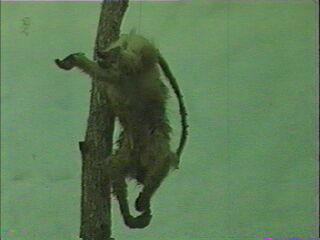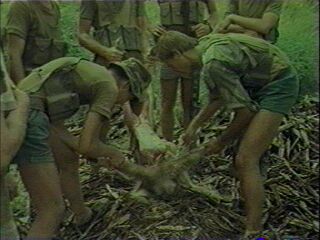

 The Accurate Reloading Forums
The Accurate Reloading Forums  THE ACCURATE RELOADING.COM FORUMS
THE ACCURATE RELOADING.COM FORUMS  Hunting
Hunting  African Big Game Hunting
African Big Game Hunting  Hungry Mwenzi villagers survive on baboons
Hungry Mwenzi villagers survive on baboonsGo  | New  | Find  | Notify  | Tools  | Reply  |  |
| one of us |
Hungry Mwenezi villagers survive on baboons http://www.dailynews.co.zw By Godfrey Mtimba Friday, 01 October 2010 16:07 MWENEZI - The baboon population is under threat of being wiped out in Mwenezi as desperate villagers have resorted to eating the human-like wild animal to avert hunger and starvation, game ranchers in the area have revealed. Hunger and starvation continue to dog thousands of villagers in the arid district, forcing residents to survive on wild fruits, animals and roots, following a poor agricultural season caused by low rainfall and a myriad of artificial problems including the shortage of inputs. National Parks officials in Mwenezi expressed concern over the depreciation of the baboon population in the district conservancies as poaching has suddenly increased with villagers claiming that they have no option except to survive on baboons that roam around villages. A National Parks official in Mwenezi, Edmond Garwe the Daily News that poaching of baboons had become rampant and they were struggling to contain poachers. "We are experiencing a rare form of poaching here. "This is our first time to realise that people eat baboons. Villagers are forced to do this because of starvation here; people are hungry and they do not have grain so they are now surviving on wild animals and fruits. "But the activity is detrimental to the population of this particular specie since it is going down at an alarming rate," he said. He added that villagers were hunting baboons because the area no longer has other types of wild animals after they were exhausted by war veterans who invaded white owned farms during the chaotic land reform programme of 2000. He said the ill-equipped new farmers went on a rampage hunting wild animals after experiencing nightmares in their farms and the few wild animals left migrated to other regions leaving the baboons at the mercy of the starving villagers. Tsekelani Chauke, a villager from Chief Chitanga said they were doing this out of desperation. "We have no choice but to feed on baboons because we can't watch our families die of hunger. The wild animal meat has become our food and we are surviving on it alone since we don't have the grain to prepare sadza. Mwenezi is the driest district in the province and farming is completely impossible; wild meat is our sole means of survival and the only animals that are available are baboons," he said. He said while they were aware that most people say human beings do not eat baboon meat, they are in a desperate situation as their calls for assistance from government have failed to bear any fruit. Kathi kathi@wildtravel.net 708-425-3552 "The world is a book, and those who do not travel read only one page." | ||
|
| One of Us |
When in Zambia a few years back I was told of a certain group of Africans that would throw a whole, uncleaned baboon on a fire and at come point they would consider it ready to eat. They would they have at it. Do not know if this is true or not, but this is one thing that I do not think even Cindy Garrison would try this. | |||
|
| One of Us |
I was told while hunting in CAR that the locals favorite part of a baboon were their fingers. They would suck on them for hours (cooked of course).... | |||
|
One of Us |
Well of course! If they sucked on the toes that would be a FETISH http://www.bigbore.org/ http://www.chasa.co.za Addicted to Recoil ! I hunt because I am human. Hunting is the expression of my humanity... | |||
|
| One of Us |
the villagers in Uganda where eager to get the baboon meat when I was there this spring. It seams there are a lot of people all over africa who like baboon meat. we imposed a ban on Steve showing his feet we where afraid it would mentally damage the locals | |||
|
| one of us |
Even Mrs Shakari complains when I start combing my feet in the lounge! | |||
|
| One of Us |
Just can't figure out why it's taken so long for them to utilize this great source of protein. The parks spokesman obviously doesn't know his country very well - certain people have been eating baboons here forever. Here is an extract from 'The baboon feast', a story in my book 'The Shangaan Song'. Like other Shangaans from our area, Tiyani has some extraordinary dietary preferences, baboon meat being one of these. Whilst it may seem a bizarre – and indeed repugnant – custom to most people, baboon eating is a fairly common practice in the Lowveld, a dish enjoyed by many. This practice is not exclusive to black people – certain lowvelders of European origins have also adopted the tradition, partaking in what they assure me (the uninitiated) is a delicacy. Ian de la Rue has eaten baboon on occasion, amongst other strange creatures, and my brother Jonathan eats baboon to this day, amongst other strange creatures. When Jonathan is home, he and I spend much of our time hunting baboons. This activity is one of our favourite pastimes. Having adapted well over the years to the pseudo environment created by cattle ranching and irrigated cropping, baboon numbers have recently reached an all time high. The unwritten policy is to shoot baboons on sight and, as enthusiastic youngsters will, we go about the task with gusto. Although there are many baboons, shooting them is not as easy as one would imagine. They are wily creatures with keen senses, specifically eyesight. Baboon hunting requires dedication and we are often unsuccessful. When we do get lucky, the primate (and possibly mates) is unfailingly delivered to Tiyani. No one else appreciates the treat nearly as much. A mealtime or two after a successful baboon hunt often finds Jonathan dropping in at Tiyani’s house for a bite to eat. Naturally, baboon is always on the menu. Although I steadfastly refuse to eat baboon, I usually go along for the experience, and that it surely is. Preparation of the baboon feast is an important ritual to Tiyani and he would never entrust that duty to any hands other than his own capable pair. Tiyani is a man of enviable culinary talent and he takes great pride in this ability. One of Tiyani’s favourite dishes is baboon hand starter, an appetizer served before the main meal to whet the appetite. He says that the tastiest part of a baboon is the finger and hand flesh. Firstly, and obviously, Tiyani severs the hands from the baboons in question. He then takes his honed skinning knife and carefully skins out each hand up to the finger bases, creating hand pouches. Once this intricate task is complete, he carries out a little de-boning exercise and stuffs the pouches with a few tomato and onion chunks, before tightly tying off and sealing the wrist ends. The hands are then popped into a pot of salted water and left to boil for thirty minutes or so. When cooked to his satisfaction, Tiyani removes the hands and grills them for a couple of minutes either side on hot coals – they are now ready. Each man takes a hand and the feast begins. Witnessing the consumption of baboon hands by Tiyani and Jonathan is not pretty. One by one the fingers are lopped off, and the mushy vegetable and baboon relish is slurped down eager, pulsing throats. The scene is reminiscent of schoolchildren sucking penny-cools dry – there is the same degree of concentration and the same suckling noises. Between hungry slurps the silence is palpable, such is the level of animated absorption. Due to the dedication displayed by the diners, the starter phase never lasts too long. Once the last drops of relish have been wrung out, and the finger bones nibbled clean, the hand remnants are discarded and the main course addressed in earnest, tackled actually. Fortunately the main course is a much tamer affair, usually comprising baboon stew and sadza (maize-meal). Even then it is difficult to remove one’s imagination too far from the scene. Evidence of the baboons’ demise and ingestion is always close at hand, in one form or another! After any given feast, we always rest together beneath the leafy canopy of a giant leadwood tree close to Tiyani’s hut, the two eaters digesting contentedly. This leadwood is Tiyani’s favourite tree and he religiously passes his daily siesta here, sheltering from the burning lowveld sun. Sitting propped against his leadwood tree, snorting copious quantities of snuff and reliving the finer details of yet another tasty feast in satisfied conversation with my brother. That is how I remember Tiyani. | |||
|
| One of Us |
They cant taste that bad because as I recall when the Selous scouts were going through training, one was shot on the first day and hung in a tree. After three days the baboon was cut down and thrown into a pot, maggots and all, and cooked very well. This was then served to the recruits as they had been given no food for the previous 3 days, only water. Some of the guys would even go for seconds!!!! Take note that this took place in the "valley" in summer! You can imagine how ripe that sucker was after 3 days!! | |||
|
| one of us |
 The infamous decomposing Baboon  The gutting and preparing of the rotten baboon the candidates are made to eat. The candidates are not fed for days and made to observe the rotten decomposing baboon all week, till they are told to eat it. At this point must are quite willing. Source: http://selousscouts.tripod.com/ | |||
|
| One of Us |
it's not the combing thats the problem it's all the fur you leave behind | |||
|
| One of Us |
cannibalism... Rich | |||
|
| One of Us |
If my memory serves me correctly the reason for this whole exersize was to show the recruits that it was possible to eat rotten meat as long as it was cooked properly and while it was hot. If heated up again, the botulism would possibly kill them. Please correct me if I have facts wrong. | |||
|
| one of us |
...in any case one has to be pretty desperate to force himself and swallow a rotten meat (cooked or raw) without vomiting...anyway see: "Bon Appetit - not" ... | |||
|
| One of Us |
I went to primitive skills school. The fellow who runs the school had to hire himself a cook. Because there were complaints about his cooking. He said if the fur doesn't pull out, it's good as far as he's concerned. Doesn't matter how long it's been on the highway or how bloated it is. Sand Creek November 29 1864 | |||
|
| one of us |
It takes a lot longer than a week to starve to death. Elephant Hunter, Double Rifle Shooter Society, NRA Lifetime Member, Ten Safaris, in RSA, Namibia, Zimbabwe | |||
|
| One of Us |
the Army's Jungle Warfare School in Panama teaches the "Rule of Three". You can last three minutes without air, three days without water, and three weeks without food... Rich | |||
|
| One of Us |
Mugabe land reform strikes yet again | |||
|
| Powered by Social Strata |
| Please Wait. Your request is being processed... |
|
 The Accurate Reloading Forums
The Accurate Reloading Forums  THE ACCURATE RELOADING.COM FORUMS
THE ACCURATE RELOADING.COM FORUMS  Hunting
Hunting  African Big Game Hunting
African Big Game Hunting  Hungry Mwenzi villagers survive on baboons
Hungry Mwenzi villagers survive on baboons

Visit our on-line store for AR Memorabilia

